Assessment of Literature Review and Corporate Social Responsibility
VerifiedAdded on 2020/12/10
|10
|2815
|72
Report
AI Summary
This report presents an individual analysis of literature review methodologies and a specific literature review on Corporate Social Responsibility (CSR). The report begins by defining literature review, its purpose, and the various sources and types available, including narrative, systematic, and methodological reviews. It emphasizes the value of literature reviews in identifying knowledge gaps and inconsistencies. The main body then delves into a literature review on CSR, exploring its definition, benefits, and criticisms. It examines CSR's role in sustainable growth, stakeholder engagement, and environmental and social responsibility, contrasting various perspectives on its effectiveness and motivations. The report highlights the importance of CSR in enhancing brand image, attracting customers, and promoting ethical business practices, while also acknowledging critiques regarding its potential for manipulation and focus on profits. The conclusion summarizes the significance of literature reviews and the multifaceted nature of CSR in contemporary business contexts.

Individual report
Paraphrase This Document
Need a fresh take? Get an instant paraphrase of this document with our AI Paraphraser
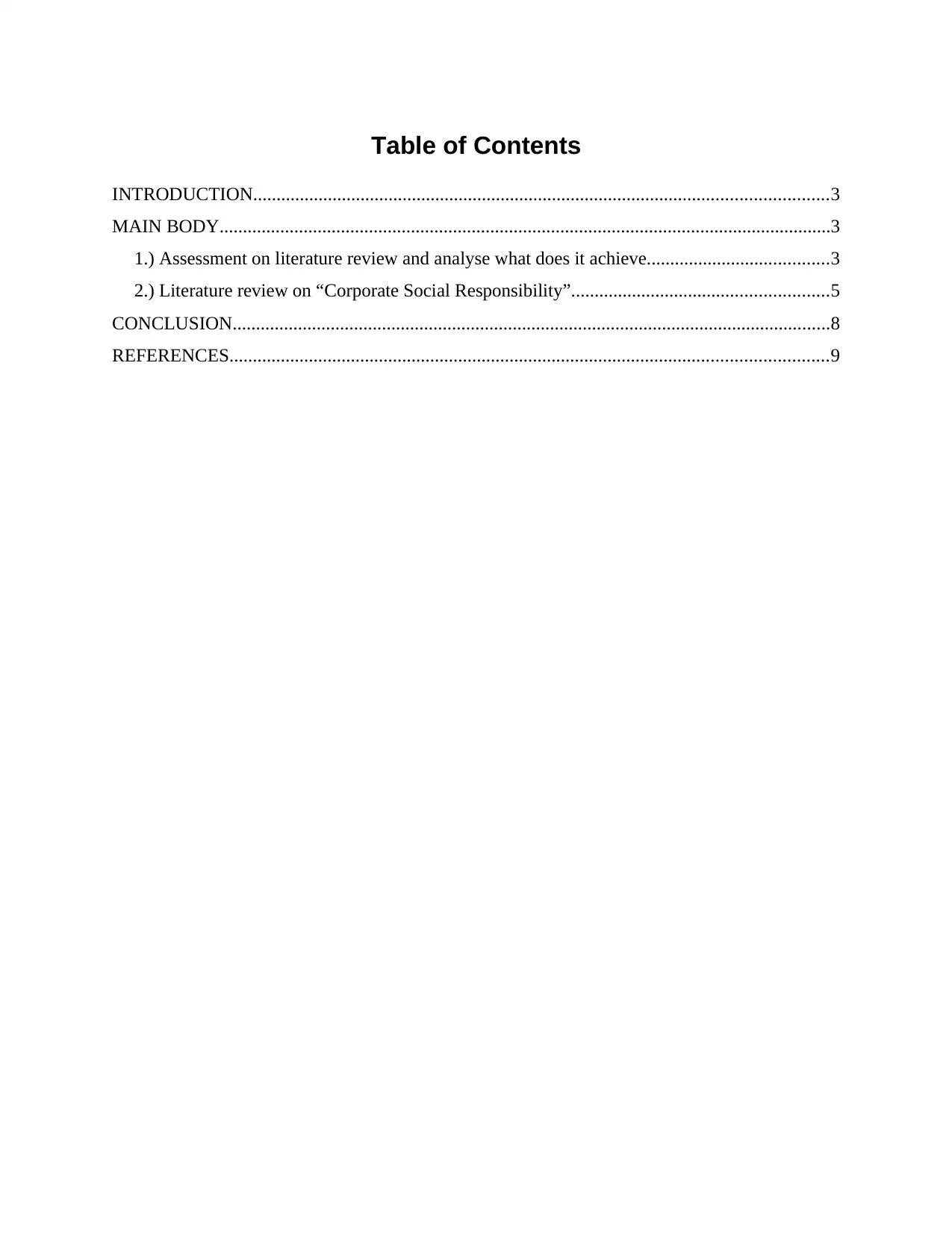
Table of Contents
INTRODUCTION...........................................................................................................................3
MAIN BODY...................................................................................................................................3
1.) Assessment on literature review and analyse what does it achieve.......................................3
2.) Literature review on “Corporate Social Responsibility”.......................................................5
CONCLUSION................................................................................................................................8
REFERENCES................................................................................................................................9
INTRODUCTION...........................................................................................................................3
MAIN BODY...................................................................................................................................3
1.) Assessment on literature review and analyse what does it achieve.......................................3
2.) Literature review on “Corporate Social Responsibility”.......................................................5
CONCLUSION................................................................................................................................8
REFERENCES................................................................................................................................9
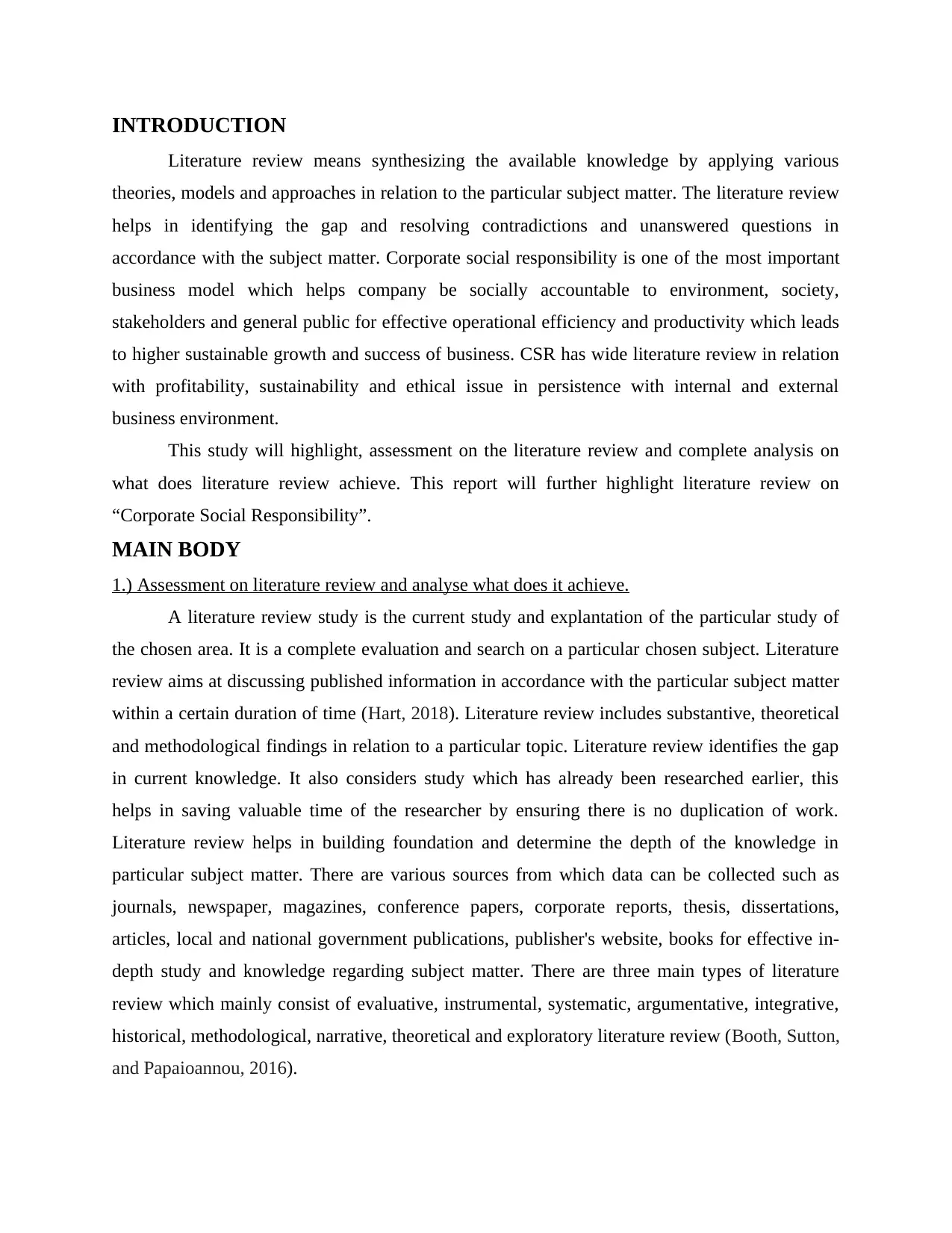
INTRODUCTION
Literature review means synthesizing the available knowledge by applying various
theories, models and approaches in relation to the particular subject matter. The literature review
helps in identifying the gap and resolving contradictions and unanswered questions in
accordance with the subject matter. Corporate social responsibility is one of the most important
business model which helps company be socially accountable to environment, society,
stakeholders and general public for effective operational efficiency and productivity which leads
to higher sustainable growth and success of business. CSR has wide literature review in relation
with profitability, sustainability and ethical issue in persistence with internal and external
business environment.
This study will highlight, assessment on the literature review and complete analysis on
what does literature review achieve. This report will further highlight literature review on
“Corporate Social Responsibility”.
MAIN BODY
1.) Assessment on literature review and analyse what does it achieve.
A literature review study is the current study and explantation of the particular study of
the chosen area. It is a complete evaluation and search on a particular chosen subject. Literature
review aims at discussing published information in accordance with the particular subject matter
within a certain duration of time (Hart, 2018). Literature review includes substantive, theoretical
and methodological findings in relation to a particular topic. Literature review identifies the gap
in current knowledge. It also considers study which has already been researched earlier, this
helps in saving valuable time of the researcher by ensuring there is no duplication of work.
Literature review helps in building foundation and determine the depth of the knowledge in
particular subject matter. There are various sources from which data can be collected such as
journals, newspaper, magazines, conference papers, corporate reports, thesis, dissertations,
articles, local and national government publications, publisher's website, books for effective in-
depth study and knowledge regarding subject matter. There are three main types of literature
review which mainly consist of evaluative, instrumental, systematic, argumentative, integrative,
historical, methodological, narrative, theoretical and exploratory literature review (Booth, Sutton,
and Papaioannou, 2016).
Literature review means synthesizing the available knowledge by applying various
theories, models and approaches in relation to the particular subject matter. The literature review
helps in identifying the gap and resolving contradictions and unanswered questions in
accordance with the subject matter. Corporate social responsibility is one of the most important
business model which helps company be socially accountable to environment, society,
stakeholders and general public for effective operational efficiency and productivity which leads
to higher sustainable growth and success of business. CSR has wide literature review in relation
with profitability, sustainability and ethical issue in persistence with internal and external
business environment.
This study will highlight, assessment on the literature review and complete analysis on
what does literature review achieve. This report will further highlight literature review on
“Corporate Social Responsibility”.
MAIN BODY
1.) Assessment on literature review and analyse what does it achieve.
A literature review study is the current study and explantation of the particular study of
the chosen area. It is a complete evaluation and search on a particular chosen subject. Literature
review aims at discussing published information in accordance with the particular subject matter
within a certain duration of time (Hart, 2018). Literature review includes substantive, theoretical
and methodological findings in relation to a particular topic. Literature review identifies the gap
in current knowledge. It also considers study which has already been researched earlier, this
helps in saving valuable time of the researcher by ensuring there is no duplication of work.
Literature review helps in building foundation and determine the depth of the knowledge in
particular subject matter. There are various sources from which data can be collected such as
journals, newspaper, magazines, conference papers, corporate reports, thesis, dissertations,
articles, local and national government publications, publisher's website, books for effective in-
depth study and knowledge regarding subject matter. There are three main types of literature
review which mainly consist of evaluative, instrumental, systematic, argumentative, integrative,
historical, methodological, narrative, theoretical and exploratory literature review (Booth, Sutton,
and Papaioannou, 2016).
⊘ This is a preview!⊘
Do you want full access?
Subscribe today to unlock all pages.

Trusted by 1+ million students worldwide
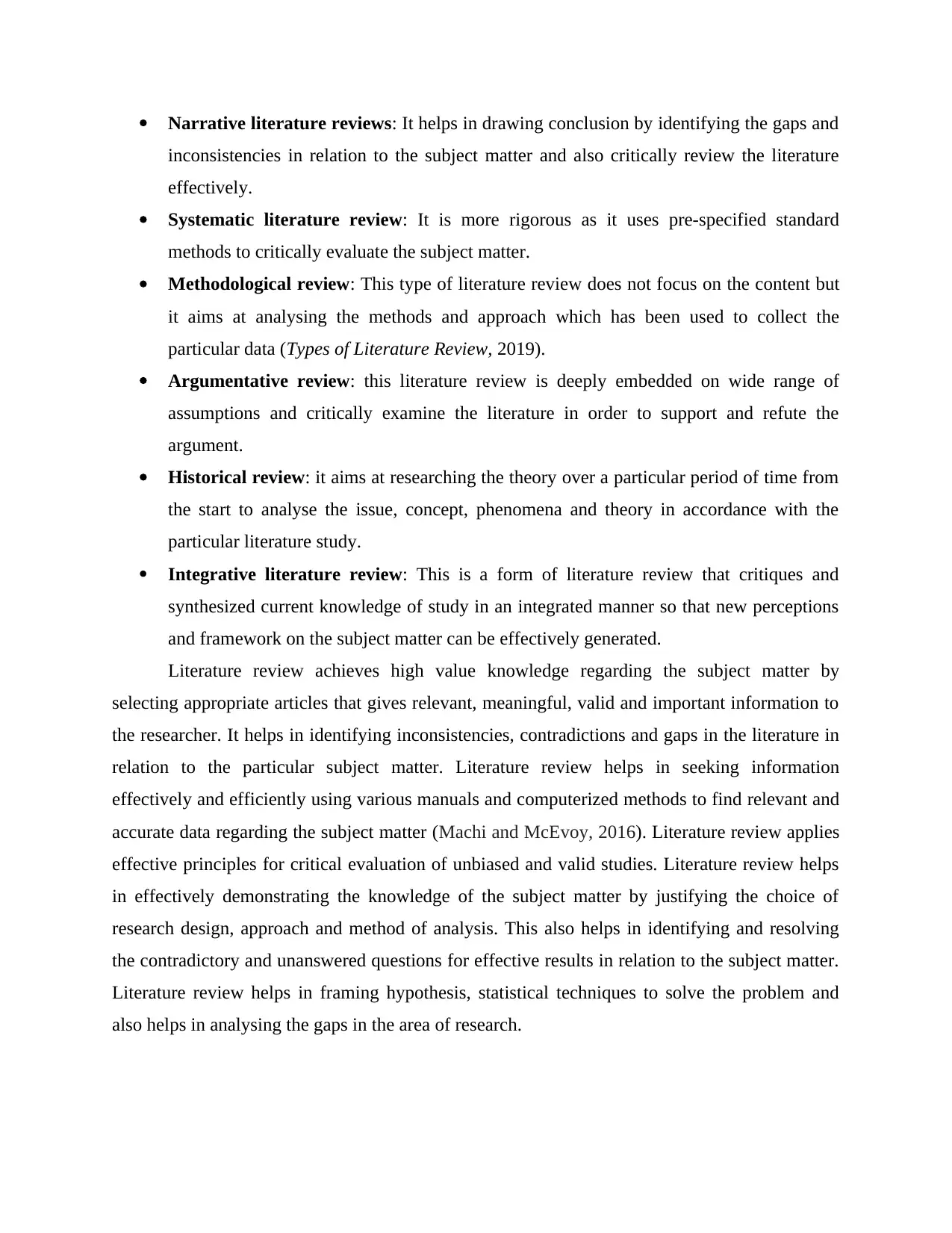
Narrative literature reviews: It helps in drawing conclusion by identifying the gaps and
inconsistencies in relation to the subject matter and also critically review the literature
effectively.
Systematic literature review: It is more rigorous as it uses pre-specified standard
methods to critically evaluate the subject matter.
Methodological review: This type of literature review does not focus on the content but
it aims at analysing the methods and approach which has been used to collect the
particular data (Types of Literature Review, 2019).
Argumentative review: this literature review is deeply embedded on wide range of
assumptions and critically examine the literature in order to support and refute the
argument.
Historical review: it aims at researching the theory over a particular period of time from
the start to analyse the issue, concept, phenomena and theory in accordance with the
particular literature study.
Integrative literature review: This is a form of literature review that critiques and
synthesized current knowledge of study in an integrated manner so that new perceptions
and framework on the subject matter can be effectively generated.
Literature review achieves high value knowledge regarding the subject matter by
selecting appropriate articles that gives relevant, meaningful, valid and important information to
the researcher. It helps in identifying inconsistencies, contradictions and gaps in the literature in
relation to the particular subject matter. Literature review helps in seeking information
effectively and efficiently using various manuals and computerized methods to find relevant and
accurate data regarding the subject matter (Machi and McEvoy, 2016). Literature review applies
effective principles for critical evaluation of unbiased and valid studies. Literature review helps
in effectively demonstrating the knowledge of the subject matter by justifying the choice of
research design, approach and method of analysis. This also helps in identifying and resolving
the contradictory and unanswered questions for effective results in relation to the subject matter.
Literature review helps in framing hypothesis, statistical techniques to solve the problem and
also helps in analysing the gaps in the area of research.
inconsistencies in relation to the subject matter and also critically review the literature
effectively.
Systematic literature review: It is more rigorous as it uses pre-specified standard
methods to critically evaluate the subject matter.
Methodological review: This type of literature review does not focus on the content but
it aims at analysing the methods and approach which has been used to collect the
particular data (Types of Literature Review, 2019).
Argumentative review: this literature review is deeply embedded on wide range of
assumptions and critically examine the literature in order to support and refute the
argument.
Historical review: it aims at researching the theory over a particular period of time from
the start to analyse the issue, concept, phenomena and theory in accordance with the
particular literature study.
Integrative literature review: This is a form of literature review that critiques and
synthesized current knowledge of study in an integrated manner so that new perceptions
and framework on the subject matter can be effectively generated.
Literature review achieves high value knowledge regarding the subject matter by
selecting appropriate articles that gives relevant, meaningful, valid and important information to
the researcher. It helps in identifying inconsistencies, contradictions and gaps in the literature in
relation to the particular subject matter. Literature review helps in seeking information
effectively and efficiently using various manuals and computerized methods to find relevant and
accurate data regarding the subject matter (Machi and McEvoy, 2016). Literature review applies
effective principles for critical evaluation of unbiased and valid studies. Literature review helps
in effectively demonstrating the knowledge of the subject matter by justifying the choice of
research design, approach and method of analysis. This also helps in identifying and resolving
the contradictory and unanswered questions for effective results in relation to the subject matter.
Literature review helps in framing hypothesis, statistical techniques to solve the problem and
also helps in analysing the gaps in the area of research.
Paraphrase This Document
Need a fresh take? Get an instant paraphrase of this document with our AI Paraphraser
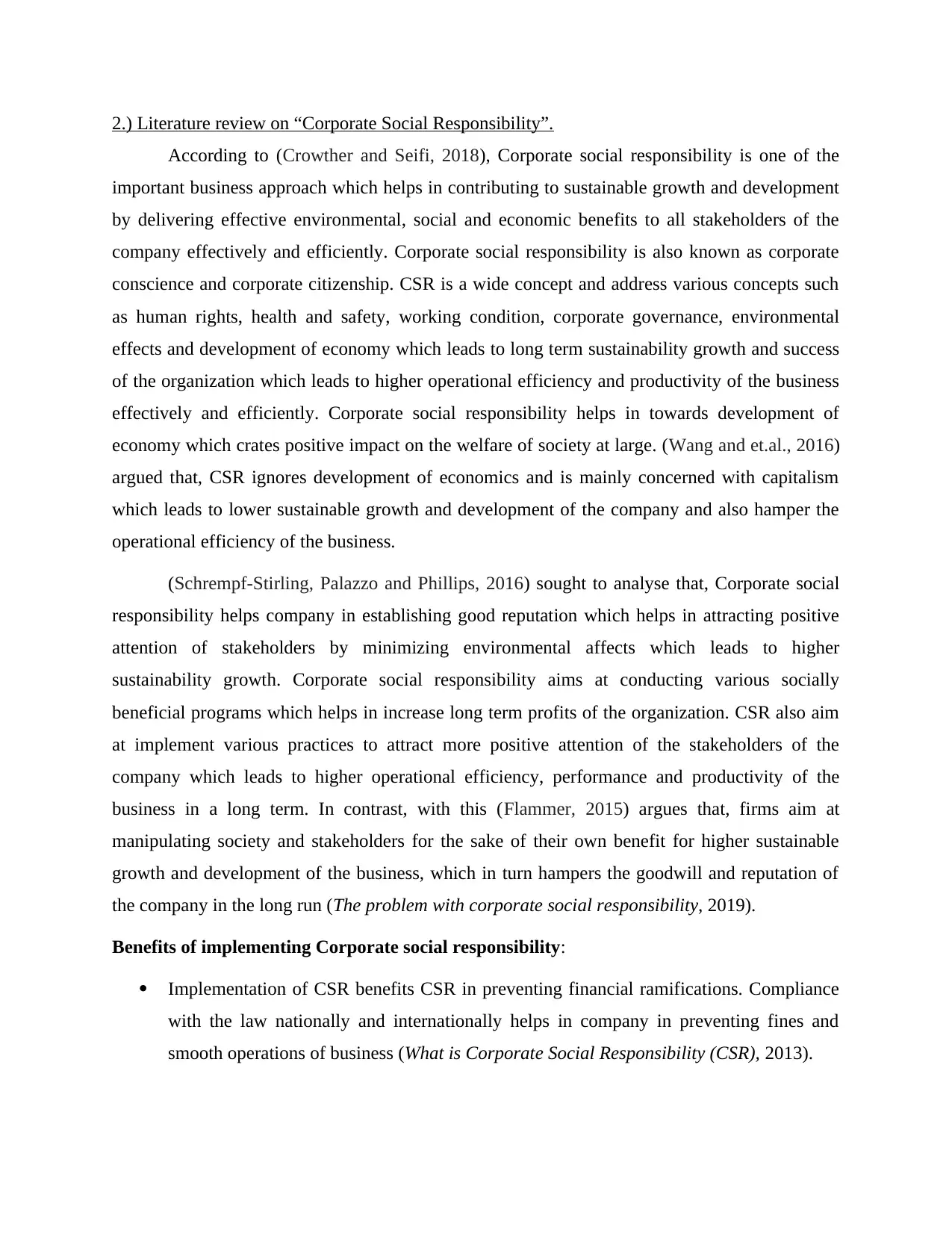
2.) Literature review on “Corporate Social Responsibility”.
According to (Crowther and Seifi, 2018), Corporate social responsibility is one of the
important business approach which helps in contributing to sustainable growth and development
by delivering effective environmental, social and economic benefits to all stakeholders of the
company effectively and efficiently. Corporate social responsibility is also known as corporate
conscience and corporate citizenship. CSR is a wide concept and address various concepts such
as human rights, health and safety, working condition, corporate governance, environmental
effects and development of economy which leads to long term sustainability growth and success
of the organization which leads to higher operational efficiency and productivity of the business
effectively and efficiently. Corporate social responsibility helps in towards development of
economy which crates positive impact on the welfare of society at large. (Wang and et.al., 2016)
argued that, CSR ignores development of economics and is mainly concerned with capitalism
which leads to lower sustainable growth and development of the company and also hamper the
operational efficiency of the business.
(Schrempf-Stirling, Palazzo and Phillips, 2016) sought to analyse that, Corporate social
responsibility helps company in establishing good reputation which helps in attracting positive
attention of stakeholders by minimizing environmental affects which leads to higher
sustainability growth. Corporate social responsibility aims at conducting various socially
beneficial programs which helps in increase long term profits of the organization. CSR also aim
at implement various practices to attract more positive attention of the stakeholders of the
company which leads to higher operational efficiency, performance and productivity of the
business in a long term. In contrast, with this (Flammer, 2015) argues that, firms aim at
manipulating society and stakeholders for the sake of their own benefit for higher sustainable
growth and development of the business, which in turn hampers the goodwill and reputation of
the company in the long run (The problem with corporate social responsibility, 2019).
Benefits of implementing Corporate social responsibility:
Implementation of CSR benefits CSR in preventing financial ramifications. Compliance
with the law nationally and internationally helps in company in preventing fines and
smooth operations of business (What is Corporate Social Responsibility (CSR), 2013).
According to (Crowther and Seifi, 2018), Corporate social responsibility is one of the
important business approach which helps in contributing to sustainable growth and development
by delivering effective environmental, social and economic benefits to all stakeholders of the
company effectively and efficiently. Corporate social responsibility is also known as corporate
conscience and corporate citizenship. CSR is a wide concept and address various concepts such
as human rights, health and safety, working condition, corporate governance, environmental
effects and development of economy which leads to long term sustainability growth and success
of the organization which leads to higher operational efficiency and productivity of the business
effectively and efficiently. Corporate social responsibility helps in towards development of
economy which crates positive impact on the welfare of society at large. (Wang and et.al., 2016)
argued that, CSR ignores development of economics and is mainly concerned with capitalism
which leads to lower sustainable growth and development of the company and also hamper the
operational efficiency of the business.
(Schrempf-Stirling, Palazzo and Phillips, 2016) sought to analyse that, Corporate social
responsibility helps company in establishing good reputation which helps in attracting positive
attention of stakeholders by minimizing environmental affects which leads to higher
sustainability growth. Corporate social responsibility aims at conducting various socially
beneficial programs which helps in increase long term profits of the organization. CSR also aim
at implement various practices to attract more positive attention of the stakeholders of the
company which leads to higher operational efficiency, performance and productivity of the
business in a long term. In contrast, with this (Flammer, 2015) argues that, firms aim at
manipulating society and stakeholders for the sake of their own benefit for higher sustainable
growth and development of the business, which in turn hampers the goodwill and reputation of
the company in the long run (The problem with corporate social responsibility, 2019).
Benefits of implementing Corporate social responsibility:
Implementation of CSR benefits CSR in preventing financial ramifications. Compliance
with the law nationally and internationally helps in company in preventing fines and
smooth operations of business (What is Corporate Social Responsibility (CSR), 2013).
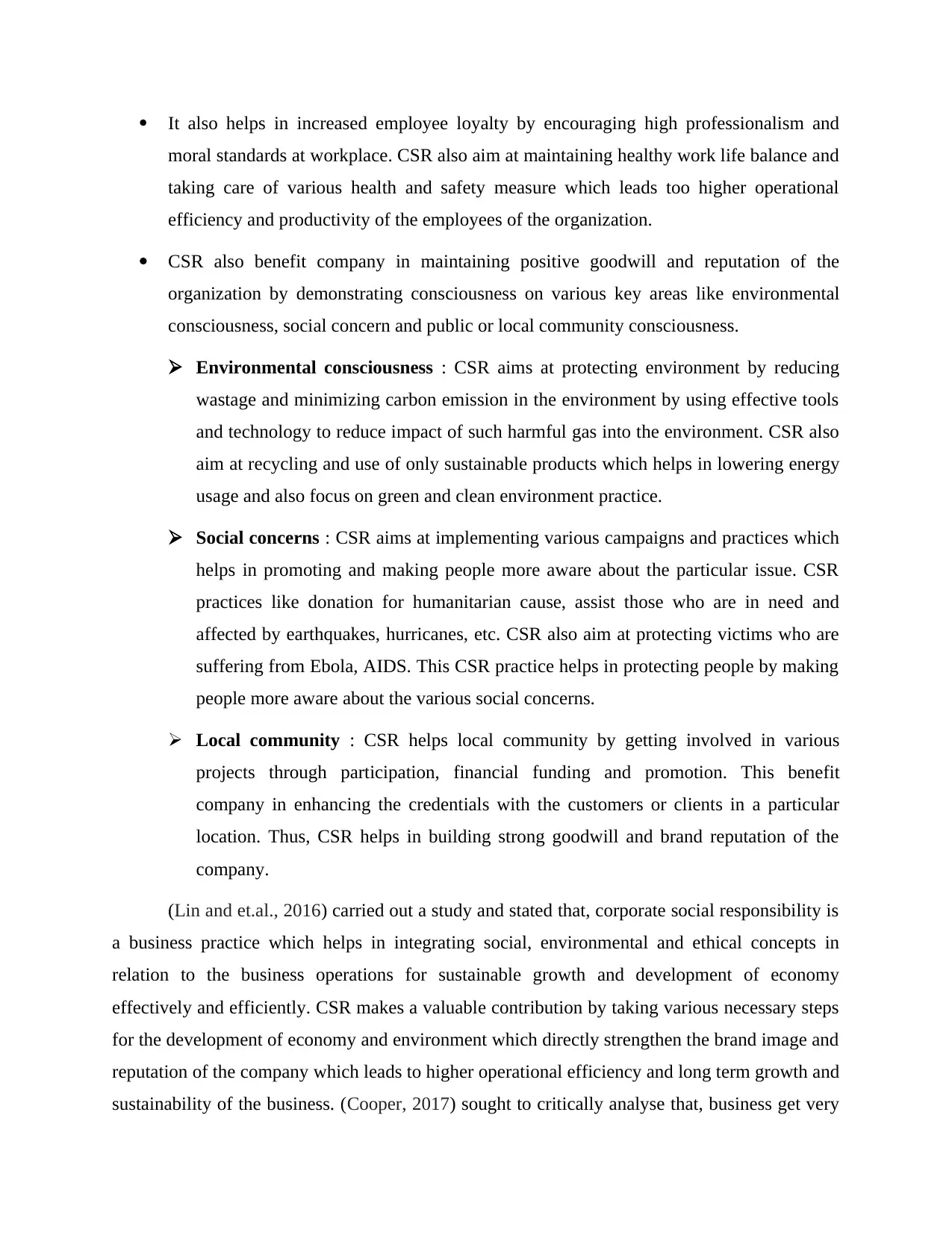
It also helps in increased employee loyalty by encouraging high professionalism and
moral standards at workplace. CSR also aim at maintaining healthy work life balance and
taking care of various health and safety measure which leads too higher operational
efficiency and productivity of the employees of the organization.
CSR also benefit company in maintaining positive goodwill and reputation of the
organization by demonstrating consciousness on various key areas like environmental
consciousness, social concern and public or local community consciousness.
Environmental consciousness : CSR aims at protecting environment by reducing
wastage and minimizing carbon emission in the environment by using effective tools
and technology to reduce impact of such harmful gas into the environment. CSR also
aim at recycling and use of only sustainable products which helps in lowering energy
usage and also focus on green and clean environment practice.
Social concerns : CSR aims at implementing various campaigns and practices which
helps in promoting and making people more aware about the particular issue. CSR
practices like donation for humanitarian cause, assist those who are in need and
affected by earthquakes, hurricanes, etc. CSR also aim at protecting victims who are
suffering from Ebola, AIDS. This CSR practice helps in protecting people by making
people more aware about the various social concerns.
Local community : CSR helps local community by getting involved in various
projects through participation, financial funding and promotion. This benefit
company in enhancing the credentials with the customers or clients in a particular
location. Thus, CSR helps in building strong goodwill and brand reputation of the
company.
(Lin and et.al., 2016) carried out a study and stated that, corporate social responsibility is
a business practice which helps in integrating social, environmental and ethical concepts in
relation to the business operations for sustainable growth and development of economy
effectively and efficiently. CSR makes a valuable contribution by taking various necessary steps
for the development of economy and environment which directly strengthen the brand image and
reputation of the company which leads to higher operational efficiency and long term growth and
sustainability of the business. (Cooper, 2017) sought to critically analyse that, business get very
moral standards at workplace. CSR also aim at maintaining healthy work life balance and
taking care of various health and safety measure which leads too higher operational
efficiency and productivity of the employees of the organization.
CSR also benefit company in maintaining positive goodwill and reputation of the
organization by demonstrating consciousness on various key areas like environmental
consciousness, social concern and public or local community consciousness.
Environmental consciousness : CSR aims at protecting environment by reducing
wastage and minimizing carbon emission in the environment by using effective tools
and technology to reduce impact of such harmful gas into the environment. CSR also
aim at recycling and use of only sustainable products which helps in lowering energy
usage and also focus on green and clean environment practice.
Social concerns : CSR aims at implementing various campaigns and practices which
helps in promoting and making people more aware about the particular issue. CSR
practices like donation for humanitarian cause, assist those who are in need and
affected by earthquakes, hurricanes, etc. CSR also aim at protecting victims who are
suffering from Ebola, AIDS. This CSR practice helps in protecting people by making
people more aware about the various social concerns.
Local community : CSR helps local community by getting involved in various
projects through participation, financial funding and promotion. This benefit
company in enhancing the credentials with the customers or clients in a particular
location. Thus, CSR helps in building strong goodwill and brand reputation of the
company.
(Lin and et.al., 2016) carried out a study and stated that, corporate social responsibility is
a business practice which helps in integrating social, environmental and ethical concepts in
relation to the business operations for sustainable growth and development of economy
effectively and efficiently. CSR makes a valuable contribution by taking various necessary steps
for the development of economy and environment which directly strengthen the brand image and
reputation of the company which leads to higher operational efficiency and long term growth and
sustainability of the business. (Cooper, 2017) sought to critically analyse that, business get very
⊘ This is a preview!⊘
Do you want full access?
Subscribe today to unlock all pages.

Trusted by 1+ million students worldwide
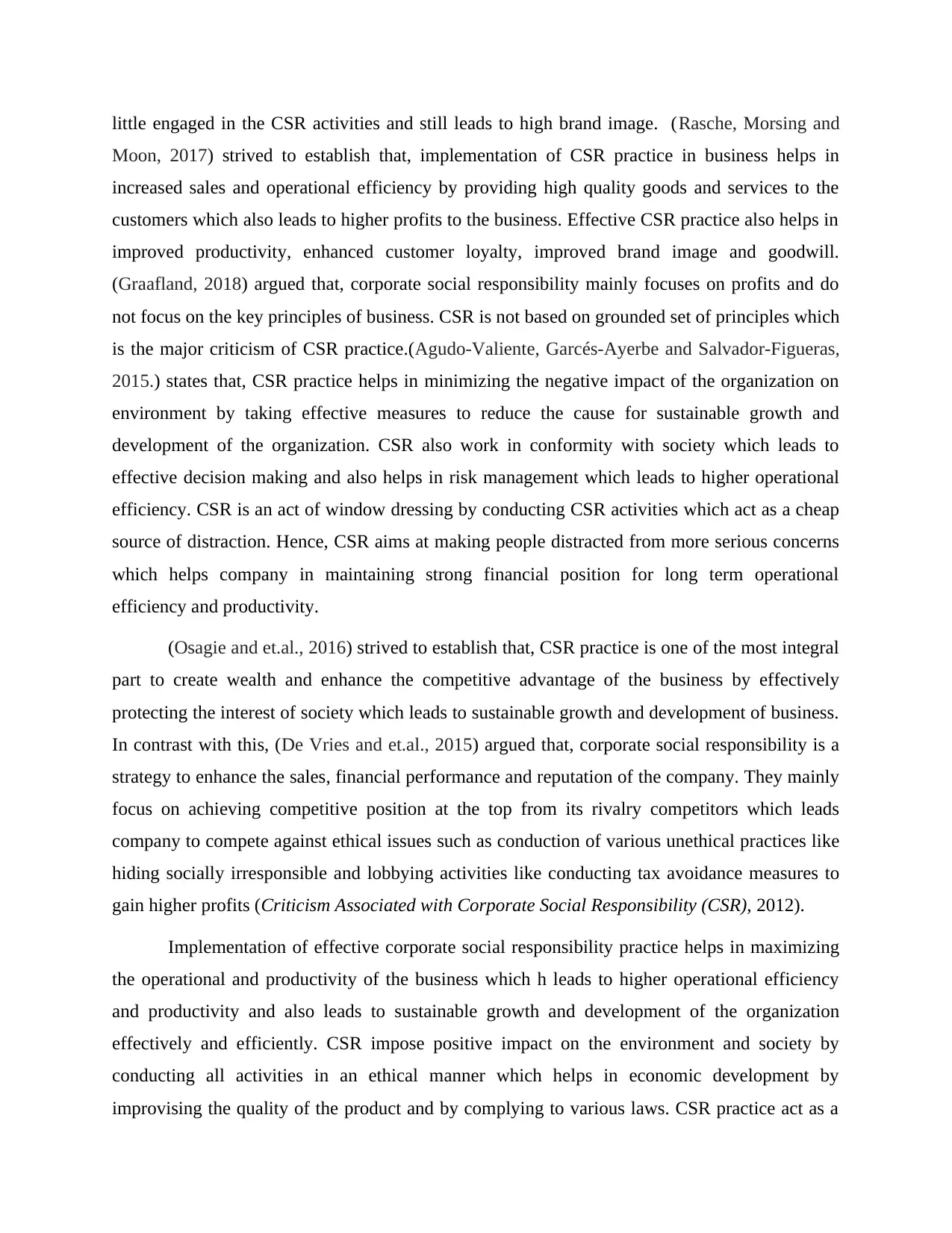
little engaged in the CSR activities and still leads to high brand image. (Rasche, Morsing and
Moon, 2017) strived to establish that, implementation of CSR practice in business helps in
increased sales and operational efficiency by providing high quality goods and services to the
customers which also leads to higher profits to the business. Effective CSR practice also helps in
improved productivity, enhanced customer loyalty, improved brand image and goodwill.
(Graafland, 2018) argued that, corporate social responsibility mainly focuses on profits and do
not focus on the key principles of business. CSR is not based on grounded set of principles which
is the major criticism of CSR practice.(Agudo‐Valiente, Garcés‐Ayerbe and Salvador‐Figueras,
2015.) states that, CSR practice helps in minimizing the negative impact of the organization on
environment by taking effective measures to reduce the cause for sustainable growth and
development of the organization. CSR also work in conformity with society which leads to
effective decision making and also helps in risk management which leads to higher operational
efficiency. CSR is an act of window dressing by conducting CSR activities which act as a cheap
source of distraction. Hence, CSR aims at making people distracted from more serious concerns
which helps company in maintaining strong financial position for long term operational
efficiency and productivity.
(Osagie and et.al., 2016) strived to establish that, CSR practice is one of the most integral
part to create wealth and enhance the competitive advantage of the business by effectively
protecting the interest of society which leads to sustainable growth and development of business.
In contrast with this, (De Vries and et.al., 2015) argued that, corporate social responsibility is a
strategy to enhance the sales, financial performance and reputation of the company. They mainly
focus on achieving competitive position at the top from its rivalry competitors which leads
company to compete against ethical issues such as conduction of various unethical practices like
hiding socially irresponsible and lobbying activities like conducting tax avoidance measures to
gain higher profits (Criticism Associated with Corporate Social Responsibility (CSR), 2012).
Implementation of effective corporate social responsibility practice helps in maximizing
the operational and productivity of the business which h leads to higher operational efficiency
and productivity and also leads to sustainable growth and development of the organization
effectively and efficiently. CSR impose positive impact on the environment and society by
conducting all activities in an ethical manner which helps in economic development by
improvising the quality of the product and by complying to various laws. CSR practice act as a
Moon, 2017) strived to establish that, implementation of CSR practice in business helps in
increased sales and operational efficiency by providing high quality goods and services to the
customers which also leads to higher profits to the business. Effective CSR practice also helps in
improved productivity, enhanced customer loyalty, improved brand image and goodwill.
(Graafland, 2018) argued that, corporate social responsibility mainly focuses on profits and do
not focus on the key principles of business. CSR is not based on grounded set of principles which
is the major criticism of CSR practice.(Agudo‐Valiente, Garcés‐Ayerbe and Salvador‐Figueras,
2015.) states that, CSR practice helps in minimizing the negative impact of the organization on
environment by taking effective measures to reduce the cause for sustainable growth and
development of the organization. CSR also work in conformity with society which leads to
effective decision making and also helps in risk management which leads to higher operational
efficiency. CSR is an act of window dressing by conducting CSR activities which act as a cheap
source of distraction. Hence, CSR aims at making people distracted from more serious concerns
which helps company in maintaining strong financial position for long term operational
efficiency and productivity.
(Osagie and et.al., 2016) strived to establish that, CSR practice is one of the most integral
part to create wealth and enhance the competitive advantage of the business by effectively
protecting the interest of society which leads to sustainable growth and development of business.
In contrast with this, (De Vries and et.al., 2015) argued that, corporate social responsibility is a
strategy to enhance the sales, financial performance and reputation of the company. They mainly
focus on achieving competitive position at the top from its rivalry competitors which leads
company to compete against ethical issues such as conduction of various unethical practices like
hiding socially irresponsible and lobbying activities like conducting tax avoidance measures to
gain higher profits (Criticism Associated with Corporate Social Responsibility (CSR), 2012).
Implementation of effective corporate social responsibility practice helps in maximizing
the operational and productivity of the business which h leads to higher operational efficiency
and productivity and also leads to sustainable growth and development of the organization
effectively and efficiently. CSR impose positive impact on the environment and society by
conducting all activities in an ethical manner which helps in economic development by
improvising the quality of the product and by complying to various laws. CSR practice act as a
Paraphrase This Document
Need a fresh take? Get an instant paraphrase of this document with our AI Paraphraser
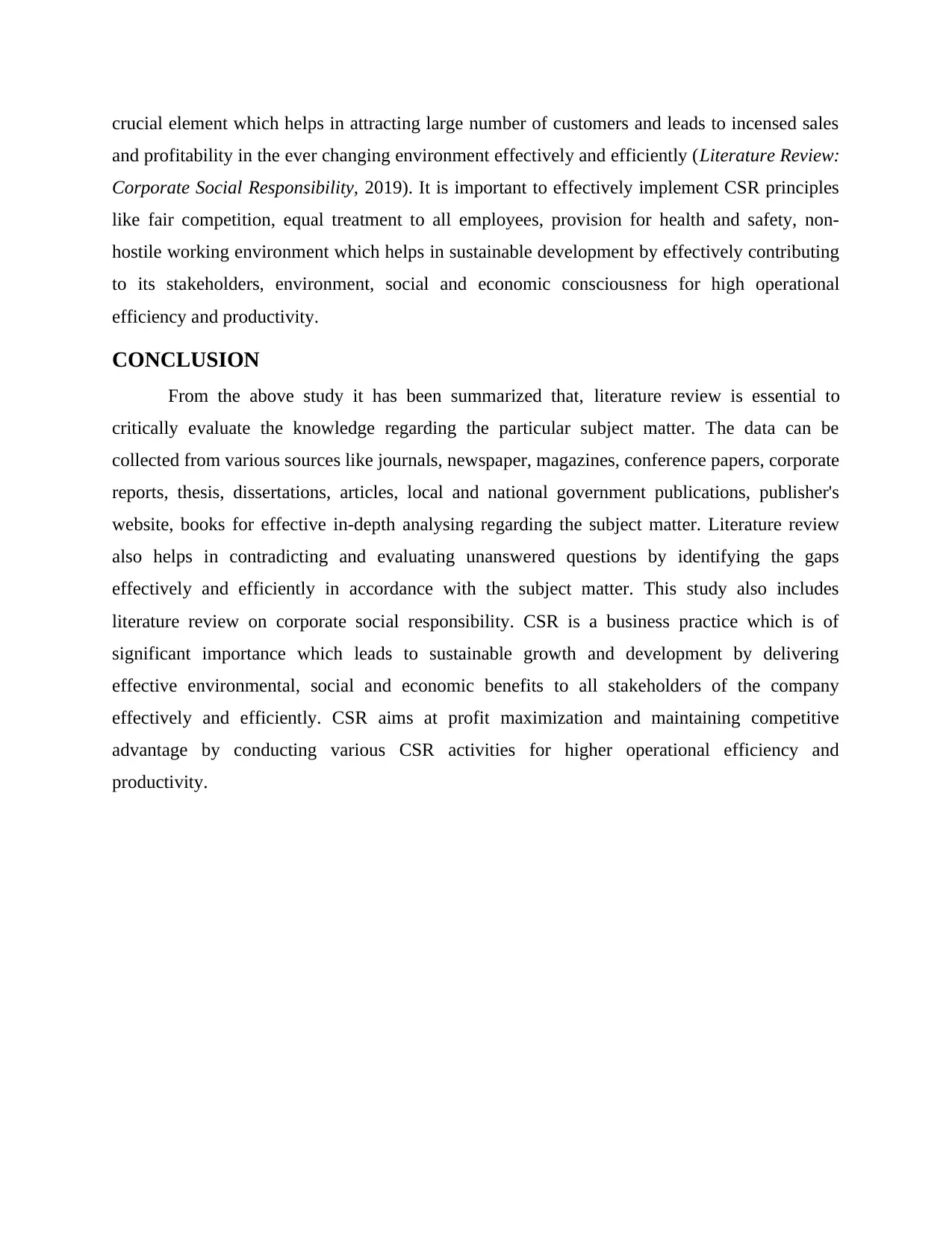
crucial element which helps in attracting large number of customers and leads to incensed sales
and profitability in the ever changing environment effectively and efficiently (Literature Review:
Corporate Social Responsibility, 2019). It is important to effectively implement CSR principles
like fair competition, equal treatment to all employees, provision for health and safety, non-
hostile working environment which helps in sustainable development by effectively contributing
to its stakeholders, environment, social and economic consciousness for high operational
efficiency and productivity.
CONCLUSION
From the above study it has been summarized that, literature review is essential to
critically evaluate the knowledge regarding the particular subject matter. The data can be
collected from various sources like journals, newspaper, magazines, conference papers, corporate
reports, thesis, dissertations, articles, local and national government publications, publisher's
website, books for effective in-depth analysing regarding the subject matter. Literature review
also helps in contradicting and evaluating unanswered questions by identifying the gaps
effectively and efficiently in accordance with the subject matter. This study also includes
literature review on corporate social responsibility. CSR is a business practice which is of
significant importance which leads to sustainable growth and development by delivering
effective environmental, social and economic benefits to all stakeholders of the company
effectively and efficiently. CSR aims at profit maximization and maintaining competitive
advantage by conducting various CSR activities for higher operational efficiency and
productivity.
and profitability in the ever changing environment effectively and efficiently (Literature Review:
Corporate Social Responsibility, 2019). It is important to effectively implement CSR principles
like fair competition, equal treatment to all employees, provision for health and safety, non-
hostile working environment which helps in sustainable development by effectively contributing
to its stakeholders, environment, social and economic consciousness for high operational
efficiency and productivity.
CONCLUSION
From the above study it has been summarized that, literature review is essential to
critically evaluate the knowledge regarding the particular subject matter. The data can be
collected from various sources like journals, newspaper, magazines, conference papers, corporate
reports, thesis, dissertations, articles, local and national government publications, publisher's
website, books for effective in-depth analysing regarding the subject matter. Literature review
also helps in contradicting and evaluating unanswered questions by identifying the gaps
effectively and efficiently in accordance with the subject matter. This study also includes
literature review on corporate social responsibility. CSR is a business practice which is of
significant importance which leads to sustainable growth and development by delivering
effective environmental, social and economic benefits to all stakeholders of the company
effectively and efficiently. CSR aims at profit maximization and maintaining competitive
advantage by conducting various CSR activities for higher operational efficiency and
productivity.
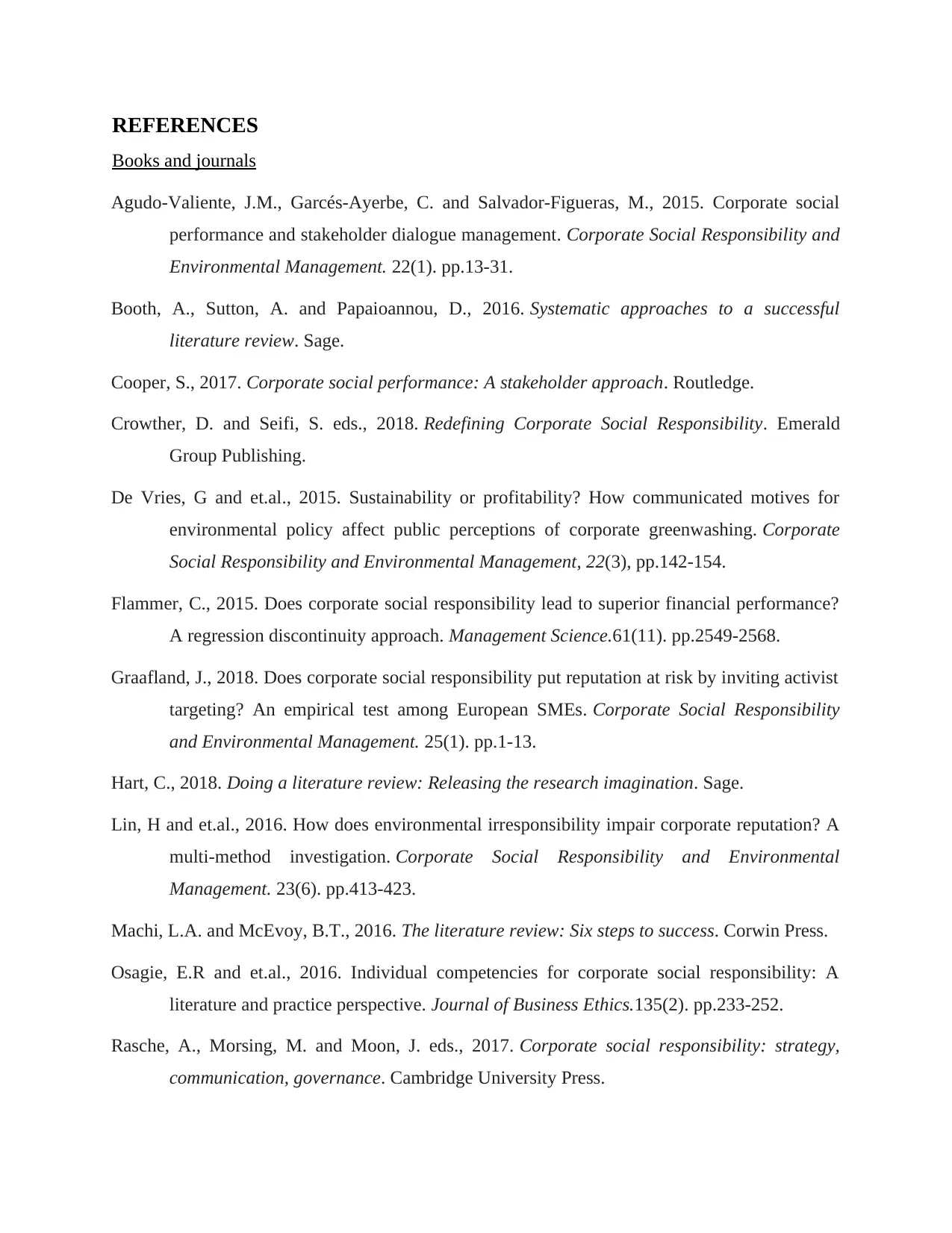
REFERENCES
Books and journals
Agudo‐Valiente, J.M., Garcés‐Ayerbe, C. and Salvador‐Figueras, M., 2015. Corporate social
performance and stakeholder dialogue management. Corporate Social Responsibility and
Environmental Management. 22(1). pp.13-31.
Booth, A., Sutton, A. and Papaioannou, D., 2016. Systematic approaches to a successful
literature review. Sage.
Cooper, S., 2017. Corporate social performance: A stakeholder approach. Routledge.
Crowther, D. and Seifi, S. eds., 2018. Redefining Corporate Social Responsibility. Emerald
Group Publishing.
De Vries, G and et.al., 2015. Sustainability or profitability? How communicated motives for
environmental policy affect public perceptions of corporate greenwashing. Corporate
Social Responsibility and Environmental Management, 22(3), pp.142-154.
Flammer, C., 2015. Does corporate social responsibility lead to superior financial performance?
A regression discontinuity approach. Management Science.61(11). pp.2549-2568.
Graafland, J., 2018. Does corporate social responsibility put reputation at risk by inviting activist
targeting? An empirical test among European SMEs. Corporate Social Responsibility
and Environmental Management. 25(1). pp.1-13.
Hart, C., 2018. Doing a literature review: Releasing the research imagination. Sage.
Lin, H and et.al., 2016. How does environmental irresponsibility impair corporate reputation? A
multi‐method investigation. Corporate Social Responsibility and Environmental
Management. 23(6). pp.413-423.
Machi, L.A. and McEvoy, B.T., 2016. The literature review: Six steps to success. Corwin Press.
Osagie, E.R and et.al., 2016. Individual competencies for corporate social responsibility: A
literature and practice perspective. Journal of Business Ethics.135(2). pp.233-252.
Rasche, A., Morsing, M. and Moon, J. eds., 2017. Corporate social responsibility: strategy,
communication, governance. Cambridge University Press.
Books and journals
Agudo‐Valiente, J.M., Garcés‐Ayerbe, C. and Salvador‐Figueras, M., 2015. Corporate social
performance and stakeholder dialogue management. Corporate Social Responsibility and
Environmental Management. 22(1). pp.13-31.
Booth, A., Sutton, A. and Papaioannou, D., 2016. Systematic approaches to a successful
literature review. Sage.
Cooper, S., 2017. Corporate social performance: A stakeholder approach. Routledge.
Crowther, D. and Seifi, S. eds., 2018. Redefining Corporate Social Responsibility. Emerald
Group Publishing.
De Vries, G and et.al., 2015. Sustainability or profitability? How communicated motives for
environmental policy affect public perceptions of corporate greenwashing. Corporate
Social Responsibility and Environmental Management, 22(3), pp.142-154.
Flammer, C., 2015. Does corporate social responsibility lead to superior financial performance?
A regression discontinuity approach. Management Science.61(11). pp.2549-2568.
Graafland, J., 2018. Does corporate social responsibility put reputation at risk by inviting activist
targeting? An empirical test among European SMEs. Corporate Social Responsibility
and Environmental Management. 25(1). pp.1-13.
Hart, C., 2018. Doing a literature review: Releasing the research imagination. Sage.
Lin, H and et.al., 2016. How does environmental irresponsibility impair corporate reputation? A
multi‐method investigation. Corporate Social Responsibility and Environmental
Management. 23(6). pp.413-423.
Machi, L.A. and McEvoy, B.T., 2016. The literature review: Six steps to success. Corwin Press.
Osagie, E.R and et.al., 2016. Individual competencies for corporate social responsibility: A
literature and practice perspective. Journal of Business Ethics.135(2). pp.233-252.
Rasche, A., Morsing, M. and Moon, J. eds., 2017. Corporate social responsibility: strategy,
communication, governance. Cambridge University Press.
⊘ This is a preview!⊘
Do you want full access?
Subscribe today to unlock all pages.

Trusted by 1+ million students worldwide
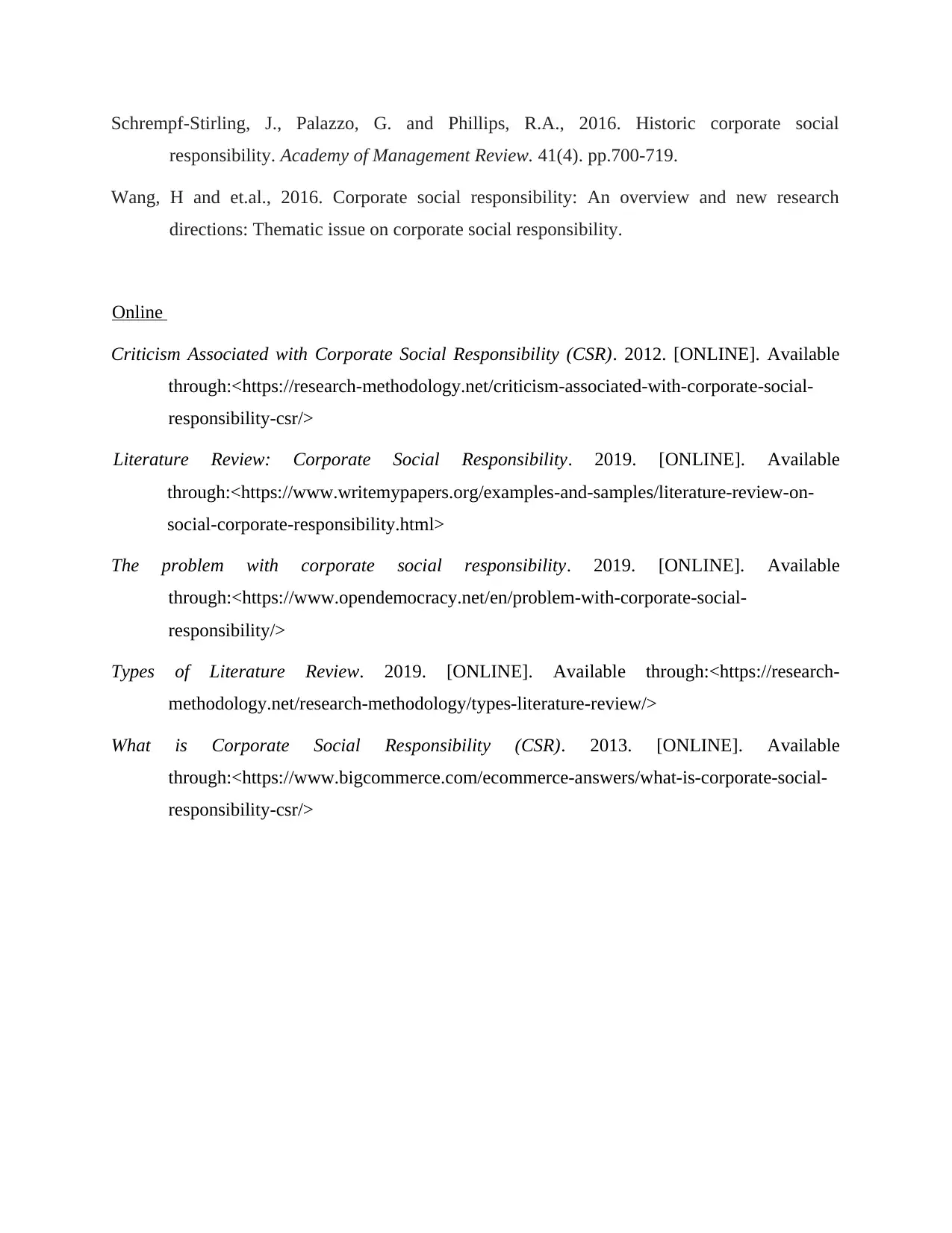
Schrempf-Stirling, J., Palazzo, G. and Phillips, R.A., 2016. Historic corporate social
responsibility. Academy of Management Review. 41(4). pp.700-719.
Wang, H and et.al., 2016. Corporate social responsibility: An overview and new research
directions: Thematic issue on corporate social responsibility.
Online
Criticism Associated with Corporate Social Responsibility (CSR). 2012. [ONLINE]. Available
through:<https://research-methodology.net/criticism-associated-with-corporate-social-
responsibility-csr/>
Literature Review: Corporate Social Responsibility. 2019. [ONLINE]. Available
through:<https://www.writemypapers.org/examples-and-samples/literature-review-on-
social-corporate-responsibility.html>
The problem with corporate social responsibility. 2019. [ONLINE]. Available
through:<https://www.opendemocracy.net/en/problem-with-corporate-social-
responsibility/>
Types of Literature Review. 2019. [ONLINE]. Available through:<https://research-
methodology.net/research-methodology/types-literature-review/>
What is Corporate Social Responsibility (CSR). 2013. [ONLINE]. Available
through:<https://www.bigcommerce.com/ecommerce-answers/what-is-corporate-social-
responsibility-csr/>
responsibility. Academy of Management Review. 41(4). pp.700-719.
Wang, H and et.al., 2016. Corporate social responsibility: An overview and new research
directions: Thematic issue on corporate social responsibility.
Online
Criticism Associated with Corporate Social Responsibility (CSR). 2012. [ONLINE]. Available
through:<https://research-methodology.net/criticism-associated-with-corporate-social-
responsibility-csr/>
Literature Review: Corporate Social Responsibility. 2019. [ONLINE]. Available
through:<https://www.writemypapers.org/examples-and-samples/literature-review-on-
social-corporate-responsibility.html>
The problem with corporate social responsibility. 2019. [ONLINE]. Available
through:<https://www.opendemocracy.net/en/problem-with-corporate-social-
responsibility/>
Types of Literature Review. 2019. [ONLINE]. Available through:<https://research-
methodology.net/research-methodology/types-literature-review/>
What is Corporate Social Responsibility (CSR). 2013. [ONLINE]. Available
through:<https://www.bigcommerce.com/ecommerce-answers/what-is-corporate-social-
responsibility-csr/>
1 out of 10
Related Documents
Your All-in-One AI-Powered Toolkit for Academic Success.
+13062052269
info@desklib.com
Available 24*7 on WhatsApp / Email
![[object Object]](/_next/static/media/star-bottom.7253800d.svg)
Unlock your academic potential
Copyright © 2020–2026 A2Z Services. All Rights Reserved. Developed and managed by ZUCOL.





